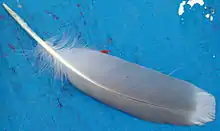plume
English
Etymology
From Latin pluma (“feather”) via Old French plume.
Pronunciation
- (Received Pronunciation, US) IPA(key): /ˈpluːm/
Audio (US) (file) - Rhymes: -uːm
Noun
plume (plural plumes)
- A feather of a bird, especially a large or showy one.
- 1667, John Milton, Paradise Lost
- wings […] of many a coloured plume
- 1667, John Milton, Paradise Lost
- The furry tail of certain dog breeds (e.g. Samoyed, Malteagle) that stands erect or curls over their backs.
- A cluster of feathers worn as an ornament, especially on a helmet.
- 1800, Robert Bloomfield, The Farmer's Boy
- his high plume, that nodded o'er his head
- 1800, Robert Bloomfield, The Farmer's Boy
- A token of honour or prowess; that on which one prides oneself; a prize or reward.
- 1667, John Milton, Paradise Lost
- ambitious to win from me some plume
- 1667, John Milton, Paradise Lost
- An area over which (or a space into which) a dispersed substance has spread or fanned out; a cloud.
- The pollutant creates a contaminant plume within an aquifer.
- After the explosion, a plume of smoke could be seen in the sky for miles around.
- An upward spray of water or mist.
- (geology) An upwelling of molten material from the Earth's mantle.
- (astronomy) An arc of glowing material erupting from the surface of a star.
- A large and flexible panicle of inflorescence resembling a feather, such as is seen in certain large ornamental grasses.
Derived terms
terms derived from plume (noun)
Translations
feather
furry, curved tail of certain dogs
|
cluster of feathers
token of honour or prowess; that on which one prides oneself; a prize or reward
|
area over which (or space into which) a dispersed substance has spread or fanned out; a cloud
|
|
upward spray
geology: upwelling of molten material
astronomy: arc of glowing material
|
Verb
plume (third-person singular simple present plumes, present participle pluming, simple past and past participle plumed)
- (transitive) To preen and arrange the feathers of.
- Washington Irving
- pluming her wings among the breezy bowers
- Washington Irving
- (transitive) To congratulate (oneself) proudly.
- He plumes himself on his skill.
- (Can we find and add a quotation of South to this entry?)
- To strip of feathers; to pluck; to strip; to pillage; also, to peel.
- (Can we find and add a quotation of Francis Bacon to this entry?)
- (Can we find and add a quotation of Dryden to this entry?)
- To adorn with feathers or plumes.
- Shakespeare
- Farewell the plumed troop.
- Shakespeare
- To form a plume.
- Smoke plumed from his pipe then slowly settled towards the floor.
- To write; to pen.
- 1749, Henry Fielding, chapter XII, in The History of Tom Jones, a Foundling. In Six Volumes, volume (please specify |volume=I to VI), London: Printed by A[ndrew] Millar, […], OCLC 928184292, book VII:
- We mention this observation, not with any view of pretending to account for so odd a behaviour, but lest some critic should hereafter plume himself on discovering it.
-
Translations
to congratulate oneself proudly
|
|
to adorn with plumes
|
to write; to pen
|
French

plume (1)
.jpg.webp)
plumes (3)
Etymology
From Old French plume, from Latin plūma.
Pronunciation
- IPA(key): /plym/
plume (file)
Derived terms
Verb
plume
Further reading

- “plume” in le Trésor de la langue française informatisé (The Digitized Treasury of the French Language).
Old English
Alternative forms
- plȳme
Etymology
From earlier *plūmæ, from Anglo-Frisian *plūmǣ , from West Germanic *plūmā; ultimately from a variant of Latin prūnum. Related to Old High German pflūma (German Pflaume).
Pronunciation
- IPA(key): /ˈpluːme/, [ˈpluːme]
Declension
Declension of plume (weak)
| Case | Singular | Plural |
|---|---|---|
| nominative | plūme | plūman |
| accusative | plūman | plūman |
| genitive | plūman | plūmena |
| dative | plūman | plūmum |
Old French
This article is issued from Wiktionary. The text is licensed under Creative Commons - Attribution - Sharealike. Additional terms may apply for the media files.